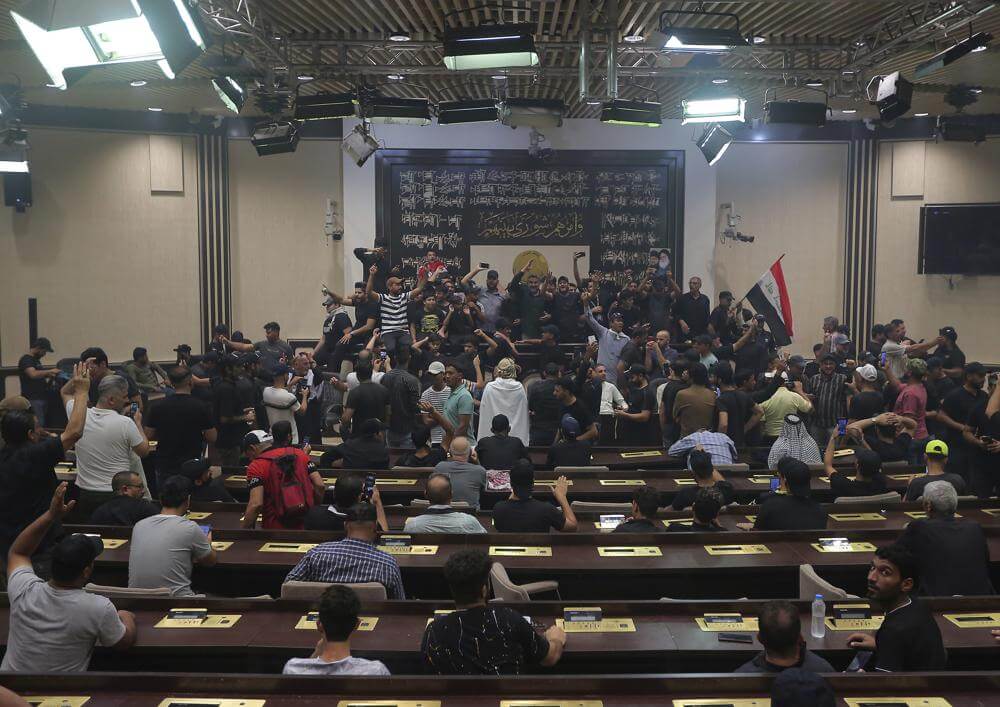Thousands of followers of Shia cleric Muqtada al-Sadr stormed the Iraqi parliament on Saturday for the second time last week to protest against efforts by Iranian allies to form government. The protesters have said they will only leave the premises if new elections are held and Sadr’s opponents are ousted.
According to the Associated Press, protesters reached Baghdad’s heavily fortified Green Zone and tore down the parliament building’s walls. Chanting slogans praising Sadr, protesters were seen dancing and praying inside the assembly.
While security forces initially fired tear gas and stun grenades to disperse the demonstrators, they eventually fled the parliament, allowing thousands to set up camp. The Iraqi Health Ministry reported that 100 protesters and 25 security personnel were injured during the clashes.
📸 #Iraq- Hundreds of followers of Iraqi Shiite cleric Muqtada al-Sadr camp at #Iraq's parliament in #Baghdad for a second day.
— Mete Sohtaoğlu (@metesohtaoglu) July 31, 2022
📸 pic.twitter.com/cgsbSdNIHb
It was the second time in a week that protesters stormed the parliament. Last Wednesday, thousands occupied the parliament building to protest the nomination of Mohammed Sudani, a Coordination Framework member, as the next Prime Minister (PM).
The Coordination Framework is an alliance of pro-Iranian parties, including the Fatah Alliance of Hadi Al-Amiri, the leader of the Badr Organization militias, former PM Nouri al-Maliki’s State of Law coalition, former PM Haider al-Abadi’s Nasr Alliance, and the Hikma party.
While the Sadrist bloc emerged victorious in the October parliamentary elections, it has not been able to form a government coalition since. In June, 73 lawmakers from Sadr’s alliance resigned over frustration at the parliament’s inability to elect a new government.
#IRAQ:
— Samya Kullab | سامية كُلاّب (@samya_kullab) July 31, 2022
Good morning from the seat of Iraq’s parliament speaker, today: pic.twitter.com/Xve6w7GLWH
While the pro-Iranian group of parties lost to Sadr’s alliance in last year’s election, the resignation of Sadrists has allowed the Coordination Framework, which came second by winning 50 seats, to form the government. Moreover, the Framework is bound to regain seats in areas where it came second. The Iraqi constitution mandates that if any seat in the parliament seat becomes vacant, the candidate who obtained the second-highest number of votes in that seat’s district would replace them.
Against this backdrop, Sadr has called on supporters to prevent pro-Iranian parties from forming the government. Calling the protests a “golden opportunity,” Sadr encouraged protesters to “radically challenge the political system, the constitution, and the elections.” Moreover, he urged all Iraqis to join the “revolution” and protest until politicians agree to reform the country.
“Yes, this is another opportunity to eliminate the darkness, corruption, exclusivity in power, loyalty to the outside, quotas, and sectarianism that have dwelled in Iraq,” he stated.
Photos show the protesters inside the Iraqi parliament.#Iraq pic.twitter.com/0NNJI49eBx
— خالد اسكيف (@khalediskef) July 31, 2022
Sadr has been a fierce opponent of foreign presence in the country, both by the United States and Iran. He has warned against Iran’s growing influence in Iraqi politics and voiced his opposition to pro-Iranian militias, including the Popular Mobilization Forces (PMF), which act as an independent security apparatus and have not integrated with the Iraqi military.
However, Iraqi Prime Minister Mustafa al-Kadhimi called for calm and urged dialogue between all sides. “Political blocs must sit down, negotiate and reach an understanding for the sake of Iraq [and] the language of treason and exclusion must be avoided,” he said.
Calling on all sides to show a “high and inclusive national spirit,” he urged parties to be “calm, patient, and rational and not be drawn into confrontation” and asked citizens “not to clash with the security forces and to respect state institutions.” In a separate statement, the PM called on protesters to “adhere to peacefulness demonstration, not to escalate the situation, and to abide by the orders of the security forces, whose goal is to protect them and official institutions.”
Iraqis fed up with Irans inference: followers of powerful Iraqi Shiite cleric Muqtada al-Sadr break into Iraq’s parliament again to prevent Iran-backed gov and vow to occupy building to prevent formation of coalition supported by Tehran https://t.co/0TikjDW1d2
— Adam Milstein (@AdamMilstein) July 31, 2022
Farhan Haq, the deputy spokesperson for United Nations Secretary-General António Guterres, said on Saturday that while “freedom of expression and peaceful assembly are fundamental rights that must be respected at all times,” all parties should take steps to “de-escalate the situation.”
Calling the situation “deeply troubling,” the UN Assistance Mission in Iraq (UNAMI) said that “voices of reason and wisdom are necessary to prevent further violence.” It also encouraged all sides to “reduce the escalation in the interest of all Iraqis.”

